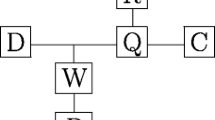Abstract
In recent years several mathematics education researchers have attempted to analyse students’ arguments using a restricted form of Toulmin’s [The Uses of Argument, Cambridge University Press, UK, 1958] argumentation scheme. In this paper we report data from task-based interviews conducted with highly talented postgraduate mathematics students, and argue that a superior categorisation of genuine mathematical argumentation is provided by the use of Toulmin’s full scheme. In particular, we suggest that modal qualifiers play an important and previously unrecognised role in mathematical argumentation, and that one of the goals of instruction should be to develop students’ abilities to appropriately match up warrant-types with modal qualifiers.
Similar content being viewed by others
References
Aberdein, A. (2005). The uses of argument in mathematics. Argumentation, 19, 287–301.
Aberdein, A. (2006). The informal logic of mathematical proof. In R. Hersh (Ed.), 18 Unconventional Essays on the Nature of Mathematics, (pp. 56–70). Berlin Heidelberg New York: Springer.
Alcolea Banegas, J. (1998). L’Argumentació en matemàtiques. In E. C. i Moya (Ed.), XIIè Congrés Valenciaà de Filosofia, (pp. 135–147). Valencià, Spain: Diputació de Valencià.
Balacheff, N. (1988). Aspects of proof in pupils’ practice of school mathematics. In D. Pimm (Ed.), Mathematics, Teachers and Children, (pp. 216–235). London, UK: Hodder.
Boero, P. (1999). Argumentation and mathematical proof: A complex, productive, unavoidable relationship in mathematics and mathematics education. International newsletter on the teaching and learning of mathematical proof. (July/August 1999)
Bromley, D. B. (1986). The case-study method in psychology and related disciplines. Chichester: Wiley.
Burton, L. (2004). Mathematicians as enquirers: Learning about learning mathematics. Dordrecht: Kluwer.
Duffin, J., & Simpson, A. (1993). Natural, conflicting and alien. Journal of Mathematical Behavior, 12, 313–328.
Duval, R. (1991). Structure du raisonnement déductif et apprentissage de la démonstration’. Educational Studies in Mathematics, 22, 233–261.
Evens, H., & Houssart, J. (2004). Categorizing pupils’ written answers to a mathematics test question: ‘I know but I can’t explain’. Educational Research, 46, 269–282.
Feferman, S. (2000). Mathematical intuition vs. mathematical monsters. Synthese, 125, 317–332.
Fischbein, E. (1982). Intuition and proof. For the Learning of Mathematics, 3(2), 9–18.
Fischbein, E. (1987). Intuition in science and mathematics. Dordrecht: Reidel.
Ginsburg, H. (1981). The Clinical interview in psychological research on mathematical thinking: Aims, rationales, techniques. For the Learning of Mathematics, 1(1), 4–11.
Hadamard, J. (1945). The psychology of invention in the mathematical field, 1954 edn. New York: Dover.
Hahn, H. (1933/1960). The crisis in intuition. In J. R. Newman (Ed.), The world of mathematics. Vol 3, (pp. 1956–1976). London: G. Allen.
Harel, G. (2001). The development of mathematical induction as a proof scheme: A model for DNR-based instruction. In S. Campbell & R. Zazkis (Eds.), Learning and teaching number theory. (pp. 185–212). Norwood, New Jersey: Ablex.
Harel, G., & Sowder, L. (1998). Students’ proof schemes: Results from exploratory studies. In A. H. Schoenfeld, J. Kaput, & E. Dubinsky (Eds.), Research in collegiate mathematics III (pp. 234–282). Providence, Rhode Island: American Mathematical Society.
Hoyles, C., & Küchemann, D. (2002). Students understanding of logical implication. Educational Studies in Mathematics, 51(3), 193–223.
Knipping, C. (2003). Argumentation structures in classroom proving situations. In M. A. Mariotti (Ed.), Proceedings of the third congress of the european society for research in mathematics education. Bellaria, Italy, ERME.
Krummheuer, G. (1995). The ethnology of argumentation. In P. Cobb & H. Bauersfeld (Eds.), The emergence of mathematical meaning: Interaction in classroom cultures. (pp. 229–269). Hillsdale: Erlbaum.
Mariotti, M. A. (2006). Proof and proving in mathematics education. In A. Gutiérrez and P. Boero (Eds.), Handbook of research on the psychology of mathematics education: Past, present and future, pp. 173–204. Rotterdam: Sense.
Markowitz, L., & Tweney, D. (1981, May). An investigation of the behavior of mathematicians engaged in testing a conjecture. Presented at Midwestern Psychological Association, Detroit, MI.
Mason, J., Burton, L., & Stacey, K. (1982). Thinking mathematically. London: Addison-Wesley.
Moore, E. H. (1900). On certain crinkly curves. Transactions of the American Mathematical Society, 1, 72–90.
Pedemonte, B. (2005). Quelques outils pour I’analyse cognitive du rapport entre argumentation et démonstration. Recherches en Didactique des Mathématiques, 25, 313–348.
Pedemonte, B. (in press). How can the relationship between argumentation and proof be analysed? To appear in Educational Studies in Mathematics.
Poincaré, H. (1905). Science and hypothesis. London: Walter Scott Publishing.
Rodd, M. M. (2000). On mathematical warrants: Proof does not always warrant, and a warrant may be other than a proof. Mathematical Thinking and Learning, 2, 221–244.
Simosi, M. (2003). Using Toulmin’s framework for the analysis of everyday argumentation: Some methodological considerations. Argumentation, 17, 185–202.
Simpson, A. (1995). Focusing on student attitudes to proof. Teaching and Learning Undergraduate Mathematics Newsletter, 3.
Tall, D. O. (2004). Building theories: The three worlds of mathematics: A comment on Inglis. For the Learning of Mathematics, 23(3), 29–32.
Thurston, W. P. (1994). On proof and progress in mathematics. Bulletin of the American Mathematical Society, 30, 161–177.
Toulmin, S. (1958). The uses of argument. UK: Cambridge University Press.
Toulmin, S. (2001). Return to reason. Cambridge, Massachusetts: Harvard University Press.
Toulmin, S., Rieke, R., & Janik, A. (1984). An introduction to reasoning (2nd ed.). New York: Macmillan.
Weber, K. (2003). Students’ difficulties with proof. MAA Research sampler 8. http://www.maa.org/t.
Weber, K., & Alcock, L. (2005). Using warranted implications to understand and validate proofs. For the Learning of Mathematics, 25(1), 34–38.
Whyburn, G. (1942). What is a curve? American Mathematical Monthly, 49, 493–497.
Yackel, E. (2001). Explanation, justification and argumentation in mathematics classrooms. In M. van den Heuvel-Panhuizen (Ed.), Proceedings of the 25th international conference on the psychology of mathematics education, Vol 1, pp.9–23. Utrecht, Holland, IGPME.
Author information
Authors and Affiliations
Corresponding author
Rights and permissions
About this article
Cite this article
Inglis, M., Mejia-Ramos, J.P. & Simpson, A. Modelling mathematical argumentation: the importance of qualification. Educ Stud Math 66, 3–21 (2007). https://doi.org/10.1007/s10649-006-9059-8
Received:
Accepted:
Published:
Issue Date:
DOI: https://doi.org/10.1007/s10649-006-9059-8




